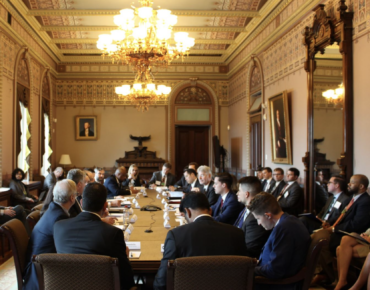U.S. Forms AI Brain Trust

Amid calls for a U.S. strategy for promoting AI development, the Trump administration is forming a senior-level panel to help coordinate government and industry research efforts.
The Select Committee on Artificial Intelligence was announced Thursday (May 10) during a White House summit organized by the Office of Science and Technology Policy (OSTP). “We cannot be passive,” said Michael Kratsios, deputy U.S. chief technology officer. “To realize the full potential of AI for the American people, it will require the combined efforts of industry, academia and government.”
The AI initiative responds to recent calls for a formal U.S. strategy for developing AI strategy as China and other nations pour billions into research efforts.
The U.S. AI panel headed by OSTP includes senior U.S. science officials, including: National Science Foundation (NSF) Director France Cordova; Walter Copan, director of the National Institute of Standards and Technology; Paul Dabbar, undersecretary for science at the Energy Department; Michael Griffin, undersecretary of defense for research and engineering; Peter Highnam, deputy director of the Defense Advanced Research Projects Agency (DARPA); and Jason Matheny, director of the Intelligence Advanced Research Projects Agency.
DARPA and NSF have already invested heavily in AI development. NSF said it funds more than $100 million annually in university research. “These AI advances span how computer systems represent knowledge, learn, process spoken and written language, and solve problems—and demonstrate how they ultimately appreciate intent, meaning and understanding more like humans,” noted NSF Director Cordova.
Meanwhile, DARPA is funding a range of AI efforts, including a “lifelong” machine learning initiative that seeks to “paradigm-changing approaches to machine learning that will enable systems to continuously improve based on experience.”
Several dozen industry executives also attended this week’s White House summit on AI. “There’s simply no replacement for the federal government significantly increasing support for fundamental research to bolster university research,” attendee Ian Buck, vice president of Nvidia’s (NASDAQ: NVDA) accelerated computing unit, noted in a blog post. “Funding drives research. Research, in turn, drives innovation, from startups to multinationals.”
Along with federal investment in AI research, Buck called for broader access to high-quality government data sets, including anonymized healthcare, industrial, weather and satellite data.
Among the other issues discussed this week were reducing barriers to AI innovation, improving R&D collaboration among U.S. allies and promoting “public awareness and understanding of A.I. technologies,” OSTP said.
Recent industry-backed AI studies have sought to tamp down concerns about privacy, algorithmic bias along with system safety and control. In arguing for a formal U.S. AI strategy, advocates have stressed the need for “systems of ethics and control” in order to “manage public anxiety” over the rise of AI.
Related
George Leopold has written about science and technology for more than 30 years, focusing on electronics and aerospace technology. He previously served as executive editor of Electronic Engineering Times. Leopold is the author of "Calculated Risk: The Supersonic Life and Times of Gus Grissom" (Purdue University Press, 2016).











